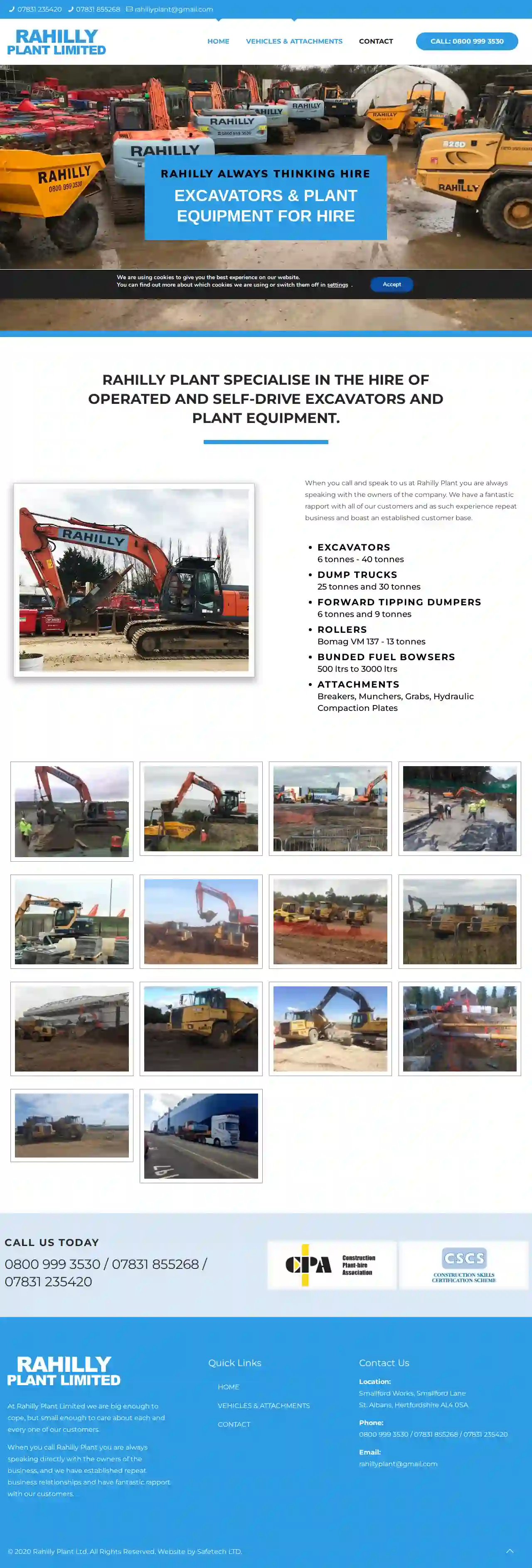Excavation Contractors Worcester Park
Find the best Trenching Services in Worcester Park
Get multiple Excavating Contractors quotes for your project today! Compare profiles, reviews, accreditations, portfolio, etc... and choose the best offer.

Rahilly Plant Ltd
55 reviewsSmallford Works, Smallford Lane, St. Albans, AL4 0SA, GBRahilly Plant: Your Trusted Partner for Excavator and Plant Equipment Hire Rahilly Plant specializes in providing high-quality operated and self-drive excavators and plant equipment for hire. We are a family-run business with a strong commitment to customer satisfaction. When you call Rahilly Plant, you're always speaking directly with the owners, ensuring personalized service and a deep understanding of your needs. We pride ourselves on our fantastic rapport with our customers, which has led to a loyal and growing customer base. We are dedicated to providing reliable equipment and exceptional service, making us the go-to choice for your construction and excavation projects. At Rahilly Plant, we are big enough to handle your project, but small enough to care about each and every one of our customers. We are committed to building long-term relationships based on trust and mutual respect.
- Services
- Why Us?
- Gallery
Get Quote
Clive Charles Construction
3.73 reviews31A Frogmore, Park Street St Albans, St Albans, AL2 2NG, GBINSPIRE, CREATE, DELIVER Clive Charles is a proven established Prime Residential/fit-out contractor with over 35 years of delivering the utmost quality. With an extensive portfolio of successfully completed projects, including the finest Listed period buildings to cutting edge contemporary residences throughout London and the UK. From concept to completion, Clive Charles maintain close relationships with the client and appointed team working collaboratively to fulfil all project objectives striving to exceed the highest expectations. "With over 30 years experience in the super prime refurbishment market, we deliver quality with efficiency and pride."
- Services
- Why Us?
- Gallery
Get Quote
Linnets Construction
51 reviewsSutton, GBAbout Us Linnets Construction is a family-run business with over 30 years of experience in building and landscaping services. We are committed to providing reliable, knowledgeable, and meticulous service to our clients. We offer free surveys, advice, and quotations to ensure you have all the information you need to make informed decisions about your project. Where we're based We are based near St Albans and also cover areas such as Harpenden, Luton, Hatfield, Welwyn, Welwyn Garden City, Hitchin, Watford, Radlett, Borehamwood, Brookmans Park, Hemel Hempstead, Berkhampstead and North London.
- Services
- Why Us?
- Gallery
Get Quote- Jo
John Sisk & Son
3.219 reviewsSutton, GB- Services
- Why Us?
Get Quote 
St Albans Basement
4.610 reviewsSutton, GB- Services
- Why Us?
Get Quote- Ki
Kilkern
4.25 reviewsSutton, GB- Services
- Why Us?
Get Quote 
RJ Deamer Groundworks
Sutton, GB- Services
- Why Us?
Get Quote- AB
AB Construction Group Ltd.
52 reviewsSutton, GB- Services
- Why Us?
Get Quote - R
R J GROUNDWORKS
Sutton, GB- Services
- Why Us?
Get Quote - Ve
Verulamium Park
4.7Sutton, GB- Services
- Why Us?
Get Quote
Over 13,059+ Excavation Contractors in our network
Our excavation providers operate in Worcester Park & surrounding areas!
ExcavationHQ has curated and vetted the Best Excavation Businesses arround Worcester Park. Find a trustworthy contractor today.
Frequently Asked Questions About Excavation Contractors
- Topsoil Removal: Stripping the fertile topsoil layer from a site, often preserving it for landscaping.
- Trench Excavation: Digging long, narrow trenches for utilities (pipes, cables) or foundations.
- Basement Excavation: Removing earth to create a space for a basement beneath a structure.
- Pool Excavation: Digging a precise hole for installing a swimming pool.
- Roadway Excavation: Removing earth and preparing the ground for road construction.
- Demolition Excavation: Clearing debris and preparing the site after demolition.
- Channel Excavation: Creating channels for drainage or irrigation.
- Planning and Surveying: Defining the excavation area, marking utility lines, and determining the required depth and grade.
- Site Preparation: Clearing vegetation, removing obstacles, and ensuring site accessibility.
- Excavation: Using appropriate equipment (excavators, backhoes, etc.) to remove earth and create the desired excavation.
- Hauling and Disposal: Transporting excavated material to designated disposal sites, complying with environmental regulations.
- Backfilling and Compaction: Refilling the excavation with suitable material and compacting it to achieve the required density and stability.
- Grading and Finishing: Leveling and shaping the surface to the final grade for landscaping or construction.
- Determining Soil Suitability: Assessing whether the soil can support the intended structure or load.
- Recommending Foundation Types: Advising on the appropriate foundation design based on soil characteristics.
- Addressing Drainage and Erosion Issues: Providing solutions to manage water runoff and prevent erosion.
- Evaluating Slope Stability: Assessing the risk of landslides or soil movement on slopes.
- Building on challenging soil types (expansive clay, loose sand, etc.)
- Constructing large or complex structures
- Excavating near slopes or retaining walls
- Addressing drainage or erosion concerns
What are the different types of excavation?
What is the difference between cut and fill excavation?
Cut: Involves excavating soil from an area where the existing grade is higher than the desired grade.
Fill: Refers to using the excavated soil ('cut' material) to raise the grade in an area where the existing grade is lower than desired.
This method minimizes the need to import or export soil, reducing costs and environmental impact. It's commonly used for site preparation, road construction, and landscaping.
What is the excavation process?
What is a soil engineer, and do I need one?
What are the different types of excavation?
- Topsoil Removal: Stripping the fertile topsoil layer from a site, often preserving it for landscaping.
- Trench Excavation: Digging long, narrow trenches for utilities (pipes, cables) or foundations.
- Basement Excavation: Removing earth to create a space for a basement beneath a structure.
- Pool Excavation: Digging a precise hole for installing a swimming pool.
- Roadway Excavation: Removing earth and preparing the ground for road construction.
- Demolition Excavation: Clearing debris and preparing the site after demolition.
- Channel Excavation: Creating channels for drainage or irrigation.
What is the difference between cut and fill excavation?
Cut: Involves excavating soil from an area where the existing grade is higher than the desired grade.
Fill: Refers to using the excavated soil ('cut' material) to raise the grade in an area where the existing grade is lower than desired.
This method minimizes the need to import or export soil, reducing costs and environmental impact. It's commonly used for site preparation, road construction, and landscaping.
What is the excavation process?
- Planning and Surveying: Defining the excavation area, marking utility lines, and determining the required depth and grade.
- Site Preparation: Clearing vegetation, removing obstacles, and ensuring site accessibility.
- Excavation: Using appropriate equipment (excavators, backhoes, etc.) to remove earth and create the desired excavation.
- Hauling and Disposal: Transporting excavated material to designated disposal sites, complying with environmental regulations.
- Backfilling and Compaction: Refilling the excavation with suitable material and compacting it to achieve the required density and stability.
- Grading and Finishing: Leveling and shaping the surface to the final grade for landscaping or construction.
What is a soil engineer, and do I need one?
- Determining Soil Suitability: Assessing whether the soil can support the intended structure or load.
- Recommending Foundation Types: Advising on the appropriate foundation design based on soil characteristics.
- Addressing Drainage and Erosion Issues: Providing solutions to manage water runoff and prevent erosion.
- Evaluating Slope Stability: Assessing the risk of landslides or soil movement on slopes.
- Building on challenging soil types (expansive clay, loose sand, etc.)
- Constructing large or complex structures
- Excavating near slopes or retaining walls
- Addressing drainage or erosion concerns